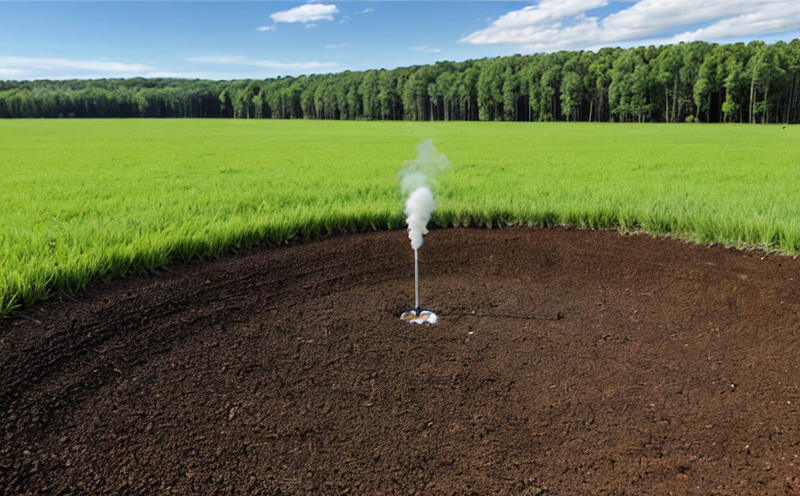DIN 38410 Cyanide Content in Mining Effluents Testing
The testing of cyanide content in mining effluents as per DIN 38410 is critical for environmental compliance and sustainable practices within the mining industry. Cyanide, a potent metal complexing agent used extensively in gold extraction processes, can pose significant risks if not properly managed. Mining companies are required to monitor and control cyanide levels in their effluents to prevent contamination of local water bodies.
According to DIN 38410, the maximum permissible concentration of free and total cyanide is set at 0.5 mg/L for surface waters and 2.0 mg/L for groundwaters. This stringent standard underscores the importance of accurate testing methods. Our laboratory specializes in providing reliable and precise measurements that ensure compliance with these regulations.
The process begins with a thorough sample collection from the mine site, following strict guidelines to avoid contamination. The collected effluent samples are then carefully transported to our state-of-the-art lab where they undergo rigorous preparation steps. These include filtration, dilution if necessary, and the addition of reagents that stabilize cyanide species.
The core testing method for measuring cyanide content in DIN 38410 involves titration using thiosulfate as a standard solution. This technique allows us to determine both free and total cyanide concentrations accurately. Our technicians are trained to perform these tests meticulously, ensuring that all variables are controlled precisely.
Upon completion of the analysis, detailed reports are generated, outlining the results for each sample tested. These reports not only provide quantitative data but also offer qualitative insights into potential issues within the mining operation that could lead to cyanide contamination. By adhering strictly to DIN 38410 standards, we ensure our clients receive reliable and actionable information necessary for maintaining compliance.
Our commitment to quality extends beyond mere testing; it encompasses continuous improvement and adherence to international best practices. Regular internal audits and external calibration checks guarantee the precision of every measurement taken under DIN 38410 guidelines. This dedication ensures that our clients can trust the integrity of their data, which is vital for making informed decisions regarding operational adjustments.
In conclusion, compliance with DIN 38410 standards is paramount in safeguarding environmental health while ensuring regulatory adherence. By leveraging advanced analytical techniques and stringent quality controls, we provide mining companies with accurate cyanide content assessments that contribute to a more sustainable future.
Quality and Reliability Assurance
- Accurate Measurements: We utilize precision instruments calibrated according to international standards to ensure accuracy in every test performed.
- Strict Sample Handling: Our team adheres strictly to protocol during sample collection, transportation, and preparation to maintain integrity throughout the testing process.
- Regular Audits: Periodic internal audits are conducted to monitor compliance with procedural protocols and ensure continuous improvement in service quality.
- External Calibration: Our equipment undergoes regular external calibration checks by accredited bodies to confirm its reliability.
These measures collectively contribute to the high level of trust we have built within our industry. With a focus on meticulous attention to detail and unwavering adherence to DIN 38410 specifications, clients can rest assured that their testing needs are met with utmost precision and integrity.
Customer Impact and Satisfaction
In today’s regulatory landscape, compliance is not just a requirement; it's a responsibility. Our DIN 38410 cyanide content testing service has helped numerous mining companies navigate complex environmental regulations effectively. By providing accurate and timely data, we enable these organizations to make informed decisions that align with their sustainability goals.
For quality managers and compliance officers, our reports serve as crucial tools for monitoring operational performance against regulatory thresholds. R&D engineers benefit from this service by gaining insights into process efficiencies and potential areas requiring optimization. For procurement teams, reliable cyanide content data ensures the selection of compliant suppliers and materials.
Client satisfaction is at the heart of what we do. We consistently strive to meet and exceed expectations through consistent excellence in testing services. Our transparent communication channels ensure that clients are kept informed every step of the way, fostering trust and collaboration.
International Acceptance and Recognition
DIN 38410 is widely recognized across Europe and beyond for its stringent requirements regarding cyanide content in mining effluents. Its adoption by various regulatory bodies underscores its importance in maintaining environmental standards globally.
The standard's emphasis on precise measurement methods aligns closely with international best practices outlined by organizations such as ISO, ASTM, EN, and IEC. This alignment enhances the credibility of our testing results among stakeholders worldwide.
Our laboratory’s adherence to DIN 38410 ensures that clients receive internationally accepted measurements, facilitating smoother interactions with partners and regulatory authorities across borders. This global acceptance is particularly beneficial for multinational mining corporations operating in multiple jurisdictions.





